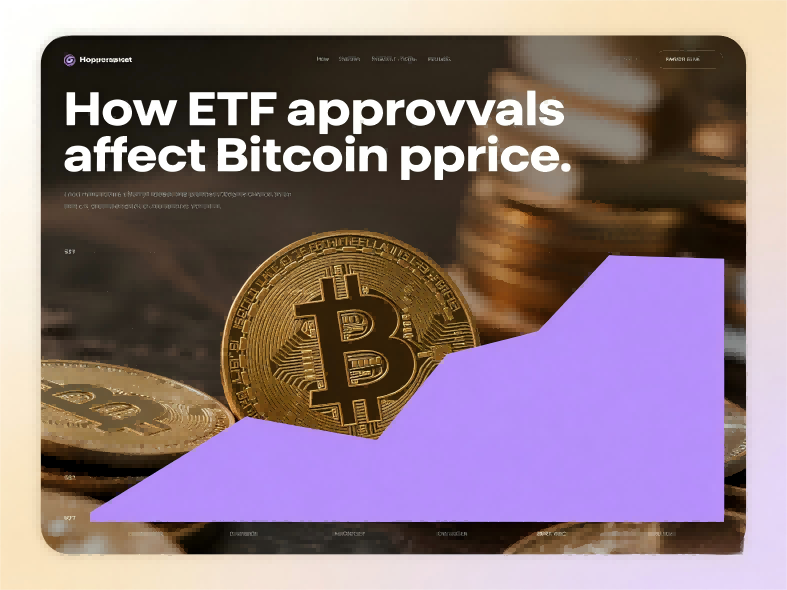It’s no longer a question of if traditional finance is embracing crypto—but how fast. With the SEC approving several Bitcoin ETFs and whispers of Ethereum ETFs gaining momentum, one question dominates headlines and Discord chats alike: What does this actually mean for Bitcoin’s price? The short answer? ETF approvals unlock a new era of accessibility, legitimacy, and capital—and the ripple effect on BTC's valuation is bigger than most realize.
Let’s explore what’s really going on behind the charts and why ETF greenlights can ignite price surges—or, at times, misleading hype.
A Bitcoin ETF (Exchange-Traded Fund) is a regulated financial product that allows investors to gain exposure to BTC price movements without actually holding the asset themselves. Think of it like buying shares of Bitcoin on the stock market, minus the crypto wallet, seed phrases, or exchange sign-ups.
Why does this matter? Because it opens the door to institutional money—retirement funds, hedge funds, wealth managers—entities that previously avoided crypto due to regulatory uncertainty or operational complexity.
When the U.S. approved its first spot Bitcoin ETFs, it was more than a rubber stamp—it was a validation.
Institutional investors don’t dabble—they commit. That’s why ETF approval often triggers inflows measured in billions. BlackRock, Fidelity, and other Wall Street giants entering the Bitcoin ETF race in early 2024 wasn’t just symbolic—it drove meaningful volume.
More capital equals more liquidity, which usually translates to higher price floors. Unlike retail investors who may panic sell or chase pumps, institutions play the long game. Their involvement brings stability and credibility.
A great example? Following the U.S. spot ETF approvals, Bitcoin surged past $48,000 in early 2024, reclaiming levels not seen since the last bull cycle. Some of that momentum came from market speculation, sure. But the sustained rally? That was real money moving in.
When regulators approve a Bitcoin ETF, it sends a clear message to the market: crypto is being taken seriously. This psychological shift alone often fuels retail FOMO (fear of missing out) and reawakens sidelined investors.
It's the domino effect—ETF news leads to headlines → headlines lead to Google Trends spikes → retail users rush in. Even if fundamentals don’t change overnight, sentiment absolutely does.
And in crypto, perception often is reality—at least in the short term.
Not every ETF-related rally leads to a sustained uptrend. Traders know the phrase "buy the rumor, sell the news" for a reason. When everyone expects a price boom post-approval, they often buy in anticipation—and sell immediately once the news is confirmed.
It happened with Canada’s and Europe’s Bitcoin ETF launches. The hype ran high, prices surged, then cooled within days.
So while ETF approvals are powerful catalysts, they’re not guarantees. They need to be viewed within broader market cycles and macroeconomic conditions.
After the Bitcoin ETF domino fell, speculation immediately turned toward Ethereum. By mid-2025, multiple ETH ETFs had gained approval in different jurisdictions—and the price reacted accordingly.
Now, discussions around Solana, Avalanche, and even DeFi index ETFs are starting to emerge. The takeaway? We’re entering an era where crypto assets are increasingly crossing into traditional finance territory.
For traders, that means the lines between Wall Street and Web3 are blurring fast—and ETF movements should absolutely be on your radar.
“When Bitcoin enters the boardroom, it doesn’t just get respect—it gains value.”
If you're serious about trading or investing in BTC, ETF activity should be part of your macro strategy. Set alerts, follow approval timelines, track fund flows, and always stay one step ahead of the narrative.
Because in crypto, the real gains come not just from knowing what happened—but understanding why it matters.
Spot trading is straightforward: you buy an asset like Bitcoin, Tesla stock, or gold, and you profit if the price goes up
Read MoreTrading has always carried an air of possibility. The idea of turning a well-timed decision into a life-changing profit a
Read MoreStart your CFD trading
Your All in One Trading APP PFD